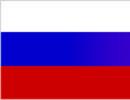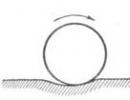The choice of word order in a sentence is determined. Direct, reverse word order and inversion in a sentence. Stylistic use of word order
The order of words in a sentence is a certain arrangement of the members of the sentence.
In the Russian language, there is a distinction between direct (usual) word order and reverse (unusual) word order, called inversion.
Direct word order requires the following:
a) additions after the control word;
b) the subject before the predicate;
c) an agreed definition before the word being defined;
d) inconsistent definition after the word being defined;
e) circumstances before or after the predicate.
But the hour came, and you left home.
I threw the treasured ring into the night. (direct word order)
At night, white and blue
The red month is coming out. (A. Blok) (inversion)
Inversion is one of the means of expressiveness of speech, since it allows, through an unusual arrangement of sentence members, to emphasize and especially highlight the necessary detail in the description.
I. Identify the types of one-part sentences. Emphasize the grammatical foundations of all sentences, indicate ways of expressing the main members. II. Indicate cases of inversion.
№ 179.
1) And a lot of songs will sink into the dark bottom of my soul, and a lot of feelings, and songs, and tears, and dreams have been given to me. 2) Two drops splashed onto the glass, the scented linden trees smelled like honey, and something approached the garden, drumming on the fresh leaves. 3) The depths of heaven are clear again, spring is in the air. and drops of tears appear from the cold of dead dreams. 4) Oh, how fun it is for me to follow the lush smoke of the through clouds - and I am glad that nothing can be freer and lighter than them. 5) She came - and everything around was melting, everything was yearning to surrender to life, and the heart, a prisoner of the winter blizzards, suddenly forgot how to shrink. 6) How cheerful the small clouds are! And in an inexplicable triumph, a round dance through the trees breathes greenish smoke. 7) I’m glad: she doesn’t distinguish me from a stone on the fly... 8) Yesterday the dawn for the first time at the porch, the evening rain began to freeze like stars.
(A. Fet)
§ 72
More on the topic Word order in a simple sentence:
- 246. Ways of expressing syntactic relations in phrases and sentences
- 284. Place of subject and predicate in a simple sentence
Order of words in a sentence The relative arrangement of the members of a sentence, which has syntactic, semantic and stylistic meaning. The first is expressed in the fact that the place occupied by a member of a sentence can be associated with its syntactic function. Thus, in the sentence Sunny day, the adjective sunny acts as a definition for the word day, the main member of the nominative sentence; with a different word order (Sunny day), the same adjective plays the role of a predicate in a two-part sentence. In sentences like Mother loves her daughter with homonymous forms of the nominative and accusative cases, the syntactic role of both nouns is determined by their place in the sentence: with direct word order ( cm. below) the subject comes first, the direct object comes second. In the sentence Free brother returned, the adjective sick occupies the position of an agreed definition, and in the sentence Brother returned sick - the position of the nominal part of the compound predicate. In identity sentences like Moscow - the capital of the USSR, the subject is in first place, and the predicate in second place; with a different word order (the capital of the USSR is Moscow), the former predicate becomes the subject, and the former subject becomes the predicate. The grammatical-semantic meaning of word order finds its expression, for example, in combinations of a cardinal number with a noun. In the sentence At the meeting there were fifty people present, the prepositive cardinal number indicates the exact number of persons; in the sentence At the meeting there were fifty people present, the postpositive numeral indicates the approximate number of persons (with the rearrangement of words, the so-called category of approximate is created).
Dictionary-reference book of linguistic terms. Ed. 2nd. - M.: Enlightenment. Rosenthal D. E., Telenkova M. A.. 1976 .
See what “word order in a sentence” is in other dictionaries:
Typology of word order (in a sentence) is one of the possible systems of typological classification of languages used in linguistic typology. Based on the basic order in which the subject and predicate appear in a sentence... ... Wikipedia
In phrases it can have a formal meaning, that is, indicate various relationships between the parts of the phrase. In the so-called analytical languages (see) PS, as a formal feature, has a predominant meaning, as, for example, in Chinese. or … Literary encyclopedia
Word order- WORD ORDER in phrases can have a formal meaning, that is, indicate different relationships between the parts of the phrase. In the so-called analytical languages (see) P.S, as a formal feature, has a predominant meaning, as, for example, in ... ... Dictionary of literary terms
Word order- Word order is a certain arrangement of words in a sentence or syntactic group. Structural types of P. s. differ in the following oppositions: progressive, or sequential (the defining word follows the qualifying word: “read a book”), ... ... Linguistic encyclopedic dictionary
word order in a simple sentence- Typical relative arrangement of word forms in their specific functions - subject, predicate, etc. The order of words performs the corresponding functions, therefore it is not constant, fixed: 1) grammatical (neutral) order... ...
A multifunctional formal device used to construct a sentence. In synthetic languages (for example, Russian) it serves mainly contextual connections of the sentence and is a means of actual division... ... Great Soviet Encyclopedia
word order- in phrases can have a formal meaning, that is, indicate various relationships between the parts of the phrase. In the so-called analytical languages (see) P.S, as a formal feature, has a predominant meaning, as, for example, in the Chinese language... ... Grammar Dictionary: Grammar and linguistic terms
reverse word order (inversion)- The order of words in a sentence that does not coincide with the order of words in the phrase. O. p.s. used in different styles. Thus, in journalistic speech it contributes to the creation of expressiveness, the fulfillment of the influencing function of the statement: ... ... Dictionary of linguistic terms T.V. Foal
See the word order is reversed (in the article the word order in a sentence) ... Dictionary of linguistic terms
There is a strong idea that word order in the Russian language is free. If it were truly free, the question of neither errors in word order nor such a stylistic device as inversion would arise. It would be more correct to say that word order in Russian is flexible: not only grammatical, but also semantic. For example, the famous line from Nekrasov IN the woodcutter's ax was heard in the forest possible with a different word order: The woodcutter's ax rang out in the forest etc. The order of words determines the meaning of these sentences: Nekrasov reports what happened in the forest, in the second version - where the woodcutter’s ax was heard.
In each specific case, the word order depends both on the grammatical nature of the words in a sentence and on the meaning of the entire sentence, which, in turn, is governed by the preceding and subsequent sentences.
180. Grammatical word order
Every sentence consists of phrases organized in one of the following ways: coordination – morning dawn, control – read the letter, adjacency – laughed merrily; Within a phrase, the grammatical order of words applies. It is predetermined by the grammatical nature of the words entering the phrase.
1. Coordination- a type of connection in which the main word requires that the dependent word take the same grammatical forms in which it itself is used. Such a connection arises between the defined and the definition, that is, between the noun and the adjective, as well as other parts of speech that can act as an adjective; participle, ordinal number, pronoun-adjective. The dependent word in all these cases comes before the main word, the process that has begun, the first successes, our disappointments. If the main word has several definitions that agree with it, then the order of arrangement depends on their morphological nature:
1) definitions expressed by pronouns come before definitions expressed by other parts of speech, for example: on this solemn day, all the typos noticed;
2) attributive pronouns precede all other pronouns, for example: all these amendments, every comment you make. But the pronoun most is placed after the demonstrative pronoun, for example: these same possibilities, the same case;
3) definitions expressed by qualitative adjectives come ahead of definitions expressed by relative adjectives (the latter, as expressing a more significant or permanent feature, come closer to the noun being defined), for example: new historical novel, late autumn;
4) if heterogeneous definitions are expressed only by qualitative adjectives, then the one that denotes a more stable attribute is placed closer to the defined noun, for example: huge black eyes, a pleasant light breeze;
5) if heterogeneous definitions are expressed only by relative adjectives, then they are usually arranged in order of ascending semantic gradation (from a narrower concept to a broader one), for example: daily weather reports, antique bronzes.
2. Control- this type of subordinating connection in which the main word of the phrase requires the placement of the dependent word in a certain case. Dependent words are nouns and noun pronouns, and main words are verbs, nouns, adjectives, participles, and gerunds: read a book, read it; reading a book, faithful to duty, reading a book, reading a book. In such combinations, where the main word precedes the dependent, objects and inconsistent modifiers expressed by nouns or pronouns appear after the words on which they depend. For example: be interested in history, the reviewer's opinion.
The lexical and grammatical meaning of the main word determines the need for a controlled word (one or more) and their form. For example, verb cut denotes an action that must be directed at something (object of action) and produced by something (instrument of action). The object to which the action extends has the form of the accusative case, and the instrument of action has the form of the instrumental case. Moreover, the obligatory nature of the object and the instrument with this verb is not the same: the object is obligatory (class of transitive verbs), therefore the control between the verb and the noun is strong here; the instrument of action is less obligatory, therefore control is weak. If the main word has several dependent ones, as in the above example, then, naturally, the more obligatory word (strong control) comes first, and then the less obligatory (weak control), so the following word order is assumed: cut (what?) paper (what?) with scissors; the arrival of (who?) son (to whom?) to his parents.
Deviation from this order is due to the semantics of dependent words: if a word with weak control denotes a person, and with strong control an object, then the word denoting a person (despite the fact that it is weak control) can come before a word with strong control denoting an object: write a letter to your brother - write a letter to your brother. If a weakly controlled word is expressed by a personal pronoun, then it must be placed immediately after the word controlling it: write him a letter, give us a surprise.
3. Adjacency- this type of subordinating connection in which the semantic relationship between the main and dependent word is not formally expressed, since the dependent word does not have inflection forms. Adjacent are adverbs, comparative adjectives, gerunds, infinitives, 3rd person possessive pronouns and other unchangeable words and forms. Adjacent qualitative adverbs in -O And -e and adverbs measures And degrees precede the main word: joyfully reported, looked defiantly, quite an adult; the rest tend to follow: speak English, ride a horse, arrive in the evening, spoke in the heat of the moment. The main word is preceded by an adjacent possessive pronoun of the 3rd person: his, her, their opinion.
The main requirement for word order in a sentence is that don't destroy(without sufficient grounds) natural lexical-grammatical connections within the phrase. Destruction leads to error. Yes, in a sentence The public is widely preparing to celebrate the artist’s fiftieth birthday, the order of words is broken and requires editing: word wide adjoins the verb Mark, but not getting ready. You should: preparing to celebrate widely. It is necessary to correct the word order in the sentence P It is prohibited to drink water from rivers and reservoirs in our region. You should: It is forbidden (what?) to drink (what?) water (what? where?) from rivers and reservoirs (what? which?) of our region.
4. The subject and predicate form a predicative phrase constructed according to the type of agreement. But this is a special type of phrase: it does not name, but informs. The subject of speech is usually the subject (expressed by a noun or parts of speech that replace it), and the message about it is conveyed by a predicate, an expressed verb, or a combination of a verb with other parts of speech. Therefore, the strictly grammatical subject of a sentence precedes the predicate (first the subject of speech is named, then something is said about it). For example: Life went on as usual; He walked through the living room into the library. In author's remarks that break direct speech or follow it, a different order is necessary: Do not rush, - said the father, - you will have time; a different word order is also preferable when the subject and predicate are semantically undifferentiated, expressed by verbs being or course of action : it rains, summer has passed, lightning flashes.
§181. Semantic word order
Free-flowing sentence components
Grammatical word order doesn't have in the Russian language it is strictly fixed. The structure of a sentence allows for variations in the arrangement of some of its components. The choice of a specific option depends on the communicative task, that is, on the meaning of the sentence. These free-standing components include:
1) circumstances(except for the manner of action, as well as measure and degree), which, as a rule, are weakly controlled members of phrases; their place may change depending on the semantics of the entire sentence. Wed: The child could not speak from fear. – The child could not speak from fright. The first sentence tells about why the child could not speak, that is, the reason is indicated, in the second - about what happened (he got scared) and the consequences;
2) participial phrases; compare: Referring to illness Petrov asked to postpone the exam– Petrov, referring to illness asked to reschedule the exam– Petrov asked to postpone the exam, referring to illness. The reason is expressed most strongly in the first sentence and weakest in the last;
3) particles; their place may change, but the more significant in each specific sentence is which particular word the particle is placed in front of. Wed: This the book is difficult even for him(we are talking about difficulties for a prepared reader); This the book is even difficult for him(the unexpectedness of the difficulty is emphasized); Even this the book is difficult for him(we are talking about a completely unprepared reader);
4) introductory words; their arrangement is free, if they relate to the sentence as a whole, changing the place of introductory words leads to a change in the modality of the utterance. Wed: It seemed he fell asleep; He, it seemed fell asleep; He fell asleep it seemed (the degree of confidence that he is sleeping decreases from the first sentence to the third). If the introductory word is connected in meaning to a separate member of the sentence, then it is placed next to it, for example: A real bird, game, began to appear, according to the hunters (Aksakov); Our dilapidated little boat tilted, scooped up and solemnly sank to the bottom, fortunately, in a shallow place(Turgenev). You should not put an introductory word between a preposition and a full word. Instead of The matter was in it would seem that, in faithful hands follows: The matter was it would seem that, in the right hands;
5) appeals; their arrangement is free, but the appeal at the beginning or end of the sentence is logically emphasized, while the appeal at the beginning of the sentence has the function of attracting attention, and at the end - expressing a request or softening a statement. Wed: Doctor, tell me, what’s wrong with my child?; Tell, doctor, what's wrong with my child?; Tell me, what's wrong with my child, doctor? Tanya, you should know this; You should have known this Tanya. In appeals, slogans, appeals, orders, oratory, official and personal letters, the appeal, as a rule, is placed at the beginning of the sentence and is often separated into an independent statement: Gentlemen judges! Please pay attention...;
6) some parts of a complex sentence; in a complex sentence, some predicative parts are rigidly fixed (clause clauses always come after the word they define, for example: House, which stands on the corner, was built...), other predicative parts are freely arranged. Wed: Since you have not fulfilled your obligation, I terminate the contract; I terminate the contract because you have not fulfilled your obligation. The choice of option, as in a simple sentence, depends on the specific communicative situation;
7) author's words in sentences with direct speech. Wed: And I, waiting for the wind, say in a low voice:– I love you, Nadya! (Chekhov); I love you, Nadya! - I say... In the first case, the author’s commentary is more important than someone else’s speech, in the second case, someone else’s speech itself is more important. If someone else's speech is sufficiently developed, it can be broken by the author's words. In this case, the author’s commentary itself is reduced to the role of almost introductory words, but the part of the statement that comes after the author’s words is highlighted. Wed: – Shouldn't we go? - I say to Nadenka,– home?
§182. Word order and the complex syntactic whole
The order of words in a sentence depends not only on the grammatical connections of words and the meaning of the entire sentence, but also on the complex syntactic whole (see Chapter XLIX) of which the sentence is part. Wed: Suddenly, someone in white separated from the wall and began to approach. From fright the child could not utter a word; Everything at school is so unusual, strict and solemn that when they asked the question: “How old are you?”, the child could not utter a word from fright.
In some cases, the nature of the development of thought in a complex syntactic whole not only determines the place of a freely located component, but also requires a departure from the strictly grammatical order of words. Wed:
1) Everyone gathered at the table. Peter brought a book and there was silence;
2) There was a book on the table. Peter brought the book;
3) And here we have this book. Peter brought the book.
In the second and third options, the logic of the development of thought subordinates grammar: in the second case it is reported who brought the book, in the third - how it came to us. In the first case, sequentially developing events are reported.
The order of words in a sentence (and its meaning) depend not only on the preceding context, but also on the subsequent one. Wed;
1) Autumn... Dry leaves slowly fall to the ground. Soon it will be covered with a continuous multi-colored carpet;
2) Autumn... Dry leaves slowly fall to the ground. It’s as if they don’t want to part with the tree;
3) Autumn... Dry leaves slowly fall to the ground, and the smoke of the fires rises to the sky.
The first sentence allows all three variants of the second sentence after it, and the second variants are conditioned by their subsequent context.
The order of words in a sentence is the arrangement of its members in it. It is believed that word order in Russian is free. However, it is not. It is relatively free due to the structural coherence of the components of the sentence and their semantic significance. Those. Russian is a language with flexible word order.
The order of words is determined by the structure and semantics of preceding sentences, the communicative task, etc. Thus, word order depends on the context. It plays an important role in actual division. Actual division is the adaptation of the grammatical structure of a sentence to the tasks of communication.
The word order, depending on the actual division, is
1. direct (Mathesius - objective) - rhema theme
Father will come / tomorrow.
2. inverse = inversion (Mathesius – subjective) – rheme theme
Tomorrow / father will arrive.
Without a rheme, a sentence does not exist.
Direct word order is called neutral, and as a result of inversion, meaningful word order arises. The function is to put emphasis. Inversion is emphasized by intonation - logical stress emphasizes the rheme.
Word order can also have a purely grammatical meaning. Then it serves to formalize the syntactic relationships between the members of the sentence. Moscow is the capital of our country. The capital of our country is Moscow. The role of subject and predicate is determined only by word order. Changing the order of words does not lead to stylistic changes in the sentence. This is broken when qualitative adjectives appear. A wonderful city - Moscow.
The word order in sentences like June is sultry has grammatical significance. Sultry June is already a nominative sentence. Place determines the function of the adjective or participle. The reassured friend left or the friend left reassured.
Word order determines the grammatical significance of homonymous forms of nouns. Day follows night. Mother loves daughter.
The order of the members of the sentence.
§ theme = mean, rheme = tale => mean tale, otherwise – inversion
§ theme = skaz, rheme = mean => skaz is mean, otherwise – inversion
§ indivisible sentences => skaz vile
§ interrogative sentences => tale mean
§ direct word order: determiner skaz mean, if the subject is first – inversion
§ compatible terms before the words being defined, otherwise – inversion
§ managed – after managers, otherwise – inversion
§ adjacent – before and after the dominant word, depending on the method of expression and the conveyed meaning
§ first indirect object, then direct, otherwise inversion
§ dependent infinitive after the word it refers to, otherwise – inversion
You can download ready-made answers for the exam, cheat sheets and other educational materials in Word format at
Use the search form
Question No. 54 Word order in Russian and its functions
relevant scientific sources:
-
| Answers for the test/exam| 2014 | Russia | docx | 0.18 MB
1. Russian language as the national language of the Russian people, the state language of the Russian Federation and the language of interethnic communication. 2. Russian language as the primary element of great Russian literature. 3.
- Answers to the exam in modern Russian language
| Answers for the test/exam| 2016 | Russia | docx | 0.09 MB
1. The meaning of the word and its compatibility. The concept of valence 2. Semantic valency and grammatical compatibility predicative unit 4. Sloform, phrase, sentence, complex
- Money and credit of Ukraine. Answers in Russian
| Answers for the test/exam| | Ukraine | docx | 0.37 MB
1. Origin of money. The role of the state in creating money. 2. A penny is a general equivalent and an absolutely liquid commodity. The essence of money 5. Money as money and money as capital. 3. Forms of money, their evolution.
- Answers to tickets for the Russian language discipline
| Answers for the test/exam| 2016 | Russia | docx | 0.16 MB
1. The concept of modern Russian literary language. Literary language and territorial dialects. Functional styles of bookish and literary language (scientific, official business, journalistic,
-
| Answers for the test/exam| 2015 | Russia | docx | 0.15 MB
- Answers on basic Russian grammar
| Answers for the test/exam| 2015 | Russia | docx | 0.17 MB
1. Language as a system. The concept of modern Russian literary language. 2. Standard of literary language. Changing language norms. Violation of language norms. 3. Standards of literary language and modern
In English, the order of words in a sentence plays a very important role - it can change the meaning of the sentence. The order of words is fixed (or rather, the order of sentence members). First, we need to remember what members of a sentence are:
subject
predicate
addition (object)
definition (attribute)
circumstance (adverbial modifier)
You can find detailed information about all members of the proposal in our other articles.
Direct word order
Direct word order is most often found in declarative sentences (affirmative and negative) and looks like this:
1) Subject + predicate + object:
I like cats. - I love cats .
In a negative sentence, the particle NOT is added:
I do not like cats. – I Not I love cats.
2) Subject + predicate + object + adverbial:
She is visiting us tomorrow. – She will visit us tomorrow.
Reverse word order
To construct a question, we need the reverse word order:
1) Predicate + subject + object:
Were you in Bristol last month? – Were you in Bristol last month?
2) Auxiliary verb in the right tense + subject + predicate + object:
Do you like cats? - Do you like cats?
3) Question word + auxiliary verb in the right tense + subject + predicate + object:
Why do you like cats? – Why do you love cats?
Inversion
Inversion is similar to reverse word order: the predicate or auxiliary verb is used first, and then the subject. The difference is that inversion can also be used in declarative sentences.
Inversion in conditional sentences
If you should have any questions, please ask me. – Should you have any questions, please ask me. – If you have any questions please contact me.
If he were a billionaire, he would buy a yacht. – Were he is a billionaire, he would buy a yacht. – If he were a billionaire, then he would buy a yacht.
If had known that, I would have told him. – Had I known that, I would have told him. – If I had known this, I would have told him.
Usually in sentences the modal verb merges with a negative particle NOT. However, in inversion with negation this cannot be done:
If you weren't a girl, you wouldn't be able to wear skirts. – Were you not a girl, you wouldn’t be able to wear skirts. – If you weren't a girl, you couldn't wear skirts.
Inversion with the modal verb may is used in wishes
May you will always be happy. – Let you will always be happy.
Inversion with adverb of place or preposition
Out came the chase, in went the horses, on sprang the boys, in got the travelers. — Together they rolled out the carriage, immediately harnessed the horses, the drivers quickly jumped onto the box and the travelers quickly got into the carriage.
This example is from Dickens's The Pickwick Papers (his official translation). Here the inversion emphasizes the dynamism of everything that is happening.
On the chair sat a boy. – A boy was sitting on a chair.
Inversion in sentences with phrases so...that... and such...that...
So beautiful was the woman that he immediately fell in love with her. – So the woman was beautiful What he immediately fell in love.
Inversion with NOT particle in negative sentences
Not until she calls will I stop worrying. – Bye She won't call, I won't stop worrying.
Inversion with the word only
Only then did I realized that I had left my umbrella at home. – Only then did I realize that I had left the umbrella at home.






